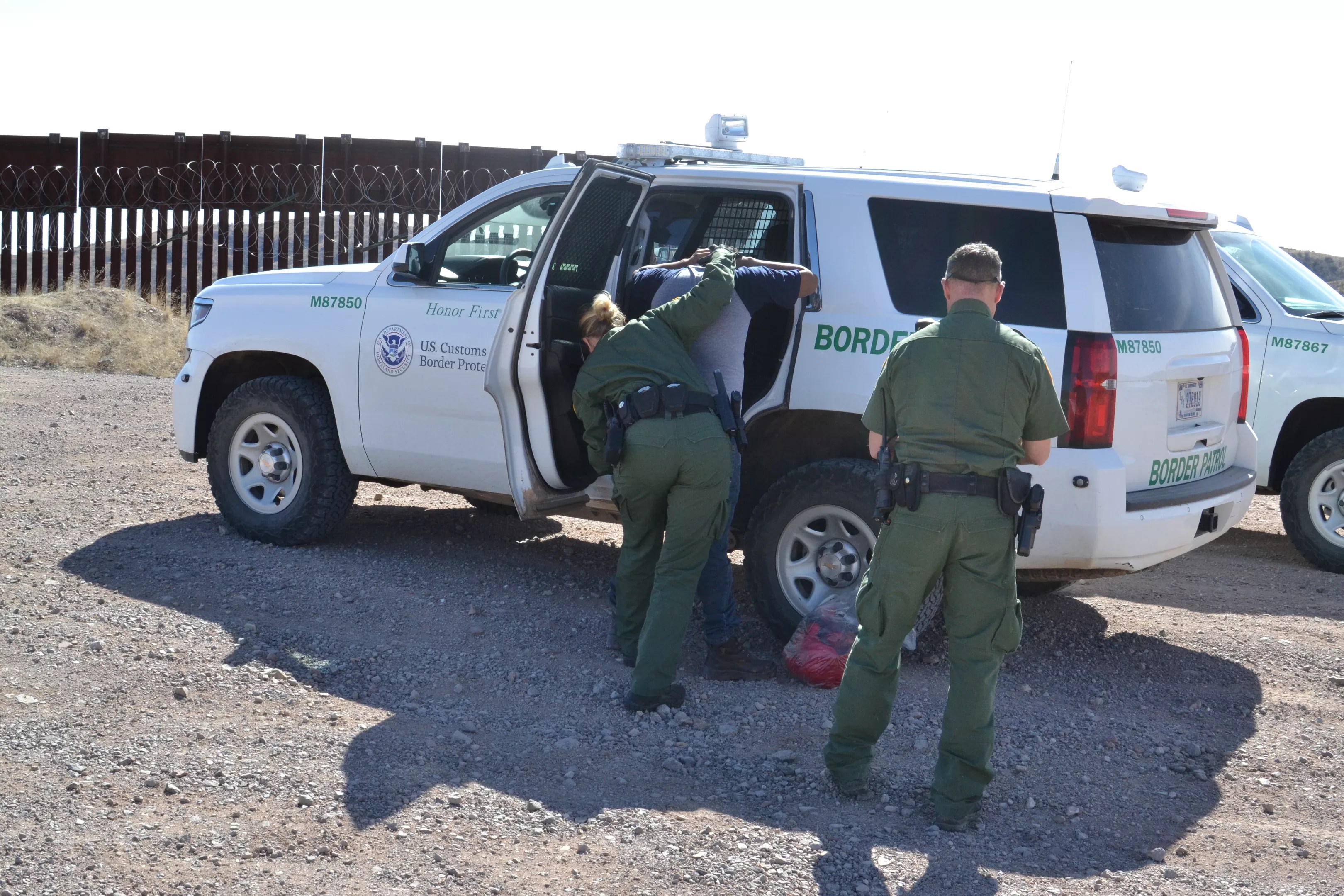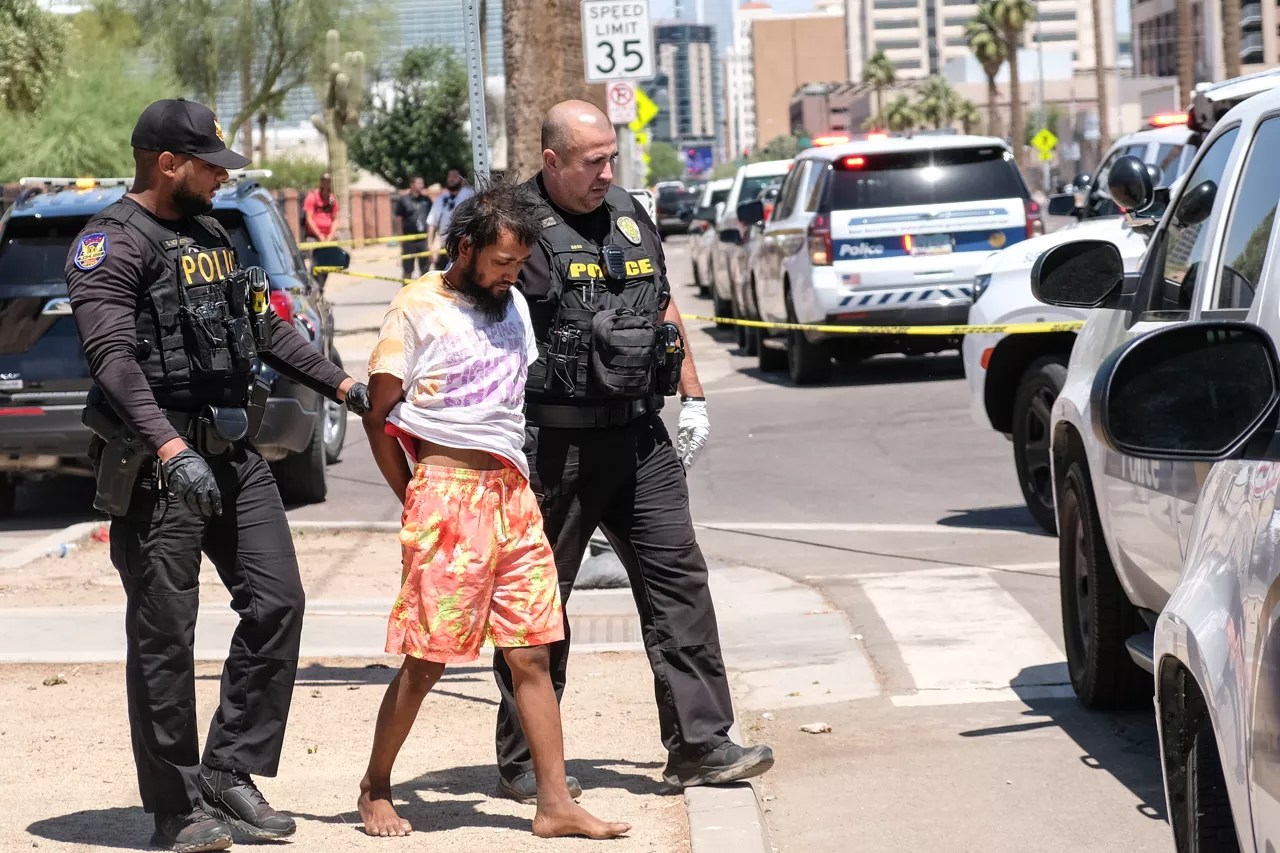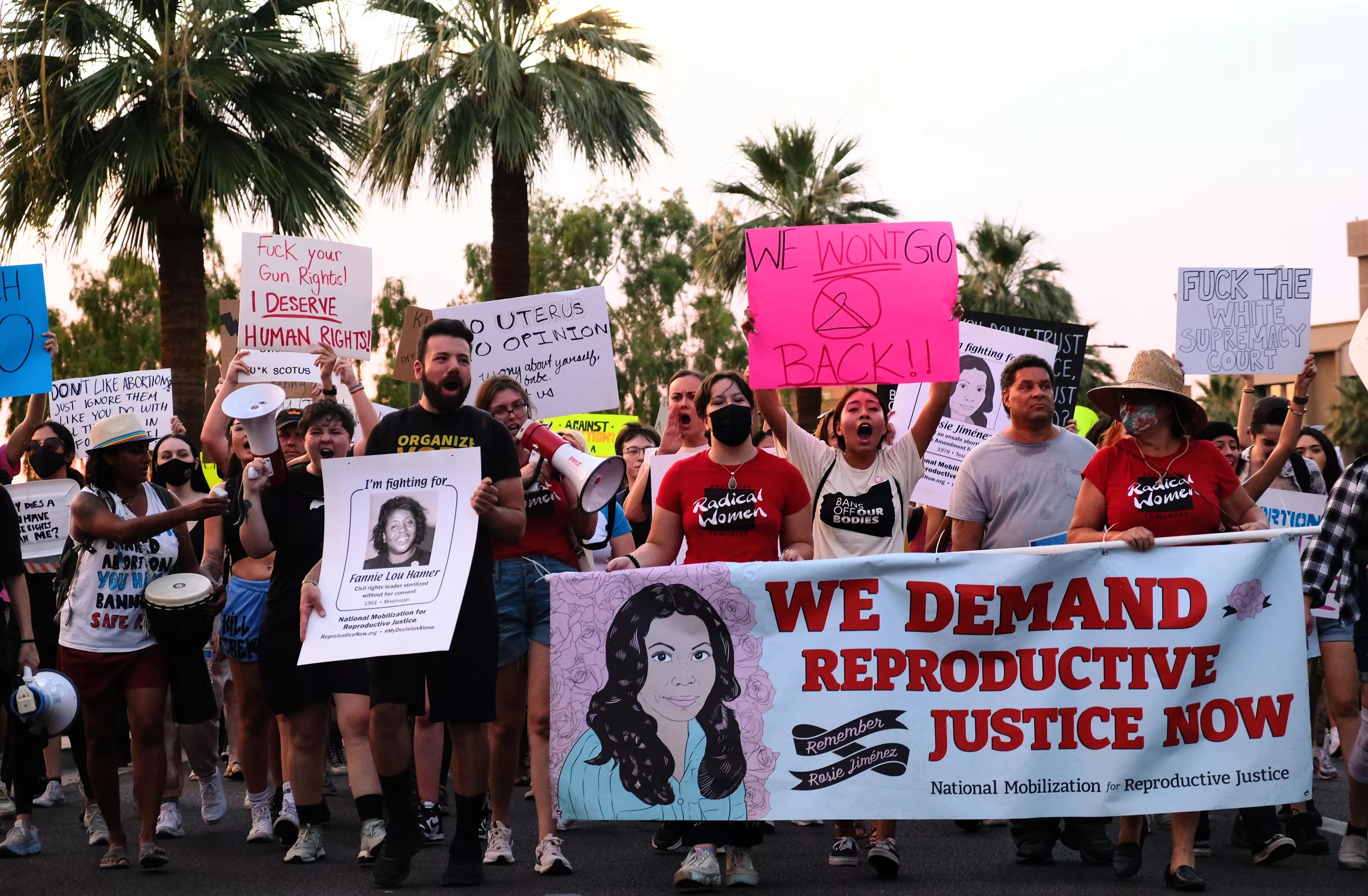
Illustration by Eric Torres. Images via SD Anderson/Flickr, Gage Skidmore/Flickr, Adobe Stock Photo, Getty Images

Audio By Carbonatix
In the run-up to the Nov. 5 election, national polls showed the contest between Kamala Harris and Donald Trump to be a dead heat, with Harris favored by some to pull out a slim victory over Trump’s Napoleonic campaign to retake the White House.
But in the hours and days after the voting ended, the extent of the Democrats’ national debacle became stunningly apparent. Trump’s nearly six-point win over Harris in Arizona capped the former president’s sweep of all seven swing states, with Trump clinching both the popular vote and an Electoral College blowout.
Republicans took the U.S. Senate and seemed poised to eke out a victory in the U.S. House, leaving Trump’s party with control of all three branches of government. He will reenter the White House with a mandate based on revenge, resentment and a longing for low prices that could easily be upended by Trump’s advocacy of high tariffs on imported goods.
While Arizona voters tempered that damage by handing a U.S. Senate seat to Democrat Ruben Gallego instead of MAGA acolyte Kari Lake, local elections broke in a similarly troublesome direction. In Maricopa County, Democrats lost a string of races arguably more important for residents of the state’s most populous county.
Rachel Mitchell, the apogee of Republican cronyism, won re-election as county attorney. Jerry Sheridan, Sheriff Joe Arpaio’s former chief deputy, who is on the Brady list of dishonest cops, triumphed over his Democratic rival by more than seven points. Democratic county recorder candidate Tim Stringham took a thrashing from Republican election denier Justin Heap.
As bad as the election results are, though, the reality of a second Trump presidency will be much worse. Another four years of MAGA governance, untethered from the need to win reelection and gifted broad immunity by the U.S. Supreme Court, could bode ill for the environment, LGBTQ+ rights and the travails of the impoverished, among other things. But Trump’s win may especially affect Arizona in three ways.
Trump has promised mass deportation and anti-immigrant repression, increasing the plight of Arizona’s undocumented immigrants. The President-elect’s unabashed pro-cop stance and his vocal support of police abuses of power probably mean curtains for any U.S. Justice Department effort to force the Phoenix Police Department into a consent decree. Even the recent restoration of reproductive rights in Arizona with the overwhelming passage of Proposition 139 is at risk, with Trump’s allies hoping for a national ban.
Here is what the Grand Canyon State can expect.

Border Patrol arrests a migrant who had jumped over the border fence near Nogales on Feb. 12, 2019.
Steven Hsieh
Immigration
Despite the emotional and economic chaos it’s sure to cause, Trump is sticking to his promise to deport the 11 million-plus undocumented persons estimated to reside in the U.S.
In a recent interview with NBC News, Trump said there would be “no price tag” for the forced exodus. Following Trump’s election, the stock price for private prison company GEO Group, which houses immigration detainees, rose 56%. GEO Group’s president hailed the company’s “unprecedented opportunity.”
Though some Trump allies are attempting to throw water on Trump’s immigration plans, longtime Arizona pro-immigrant activist Sal Reza said he believes the deportations are coming and will inflict terror and anguish on untold millions. He predicts that Arpaio’s now-defunct Tent City will be “multiplied” throughout the U.S. as the federal government detains those whom it intends to deport.
“They’re going to be utilizing military bases,” Reza said of the incoming Trump administration’s plans. “They’re going to be utilizing concentration camps. They might even use the National Guard to guard those places. It could get like that.”
Fourteen years ago, Reza helped organize a boycott of Arizona over the state’s anti-immigrant legislation Senate Bill 1070, and he was arrested more than once for leading massive demonstrations against racist politicians such as Arpaio and former state Senate President Russell Pearce.
Reza said he’s already beginning to see fear in the faces of the undocumented. He expects the federal government will ramp up raids on factories and other businesses, arresting undocumented immigrants en masse.
“Some people are talking about leaving and all of that,” Reza said. “I tell them, ‘Fuck no. You have to stay here and fight.'”
According to the Pew Research Center, Arizona currently is home to an estimated 250,000 unauthorized immigrants. That’s way down from 2007, when it was an estimated 500,000.
One reason for that drop is the 2010 passage of SB 1070, which allowed local police to stop people based on reasonable suspicion they might be in the country illegally. The law’s stated intent was to make “attrition through enforcement the public policy of all state and local government agencies in Arizona.”
Though the law was partially struck down by the U.S. Supreme Court, it cemented Arizona’s reputation as a place hostile to immigrants. Arpaio furthered that racist image with raids on employers and Latino communities, leading to a corresponding loss in tourism dollars for the state.
Everything old is new again – and worse – heading into 2025. Arpaio’s apprentice, Sheridan, is now sheriff-elect. Sheridan was part of the problem in 2013 when a federal judge found the sheriff’s office guilty of widespread racial profiling, ordering a host of reforms that are still being implemented and that have cost county taxpayers more than $250 million so far.
Reza believes Sheridan is unlikely to resume the sheriff’s office’s immigration enforcement activities while under a federal judge’s thumb. But the Latino community has a new problem. Proposition 314, which passed comfortably, makes it a crime for noncitizens to enter the country from other than a port of entry. It also empowers local police to make arrests and local judges to order deportations.
Several Arizona sheriffs opposed the measure, in no small part because it is an unfunded mandate that will inevitably lead to racial profiling. One estimate pegs the cost to implement the state immigration scheme at $325 million a year. Prop. 314 is also a copycat of a Texas law, SB 4, which is now on hold due to constitutional challenges brought by the Mexican American Legal Defense and Educational Fund and other groups. The Arizona law wouldn’t go into effect unless its Texas counterpart is upheld by the courts.
Thomas Saenz, MALDEF’s president and general counsel, said Prop. 314 “violates the supremacy of federal authority in the area of immigration.” The new law will not survive constitutional scrutiny and should not take effect, he added.
But Saenz conceded that with Trump’s ascension to power, MALDEF was losing a vital partner in its challenge to the law: the federal government. The Biden administration opposed SB 4. It seems unlikely that Trump’s administration will do the same.
Trump may also look to rescind Deferred Action for Childhood Arrivals. The program was created by the Barack Obama administration to protect persons brought to this country illegally while minors – the so-called DREAMers. As of September 2023, according to U.S. Citizenship and Immigration Services, there were more than 544,000 DACA recipients in the U.S., including more than 20,000 in Arizona.
The federal courts stopped the first Trump administration from eliminating DACA. Saenz suggested that because the DREAMers are viewed as sympathetic, Trump’s hostility to the program may not be “as deep as advertised.”
Reza said there will certainly be “casualties” in the new immigration war, though he foresees an inevitable backlash to mass deportations because businesses need the workers Trump wants to boot from the U.S.
“One of the things that I learned is that you never give up because the right wing never gives up,” he said. “They’re very consistent. Liberals are not.”

In June, the U.S. Department of Justice found that Phoenix police routinely violate the civil rights of citizens, including unhoused people.
Katya Schwenk
Police reform
A number of local pundits and politicians expressed skepticism of the U.S. Department of Justice’s blistering 126-page June report, which blasted the Phoenix Police Department’s pattern and practice of depriving people of their rights under the U.S. Constitution and federal law.
The report detailed, ad nauseam, the Phoenix police’s mistreatment of the homeless, discrimination against racial and ethnic minorities, First Amendment violations, use of excessive and often unjustified deadly force, abuse of children and the handicapped, and more. But as sickening as the details were, Phoenix’s political class was resistant to any substantial reform of the police department.
Mitchell, Ruben Gallego, the Phoenix Law Enforcement Association and most of the Phoenix City Council either openly or quietly opposed a consent decree, an official agreement between the DOJ and the city that would implement much-needed reform under the oversight of a federal judge. And yet, there seemed to be an ah-ha moment in October when police body camera footage was released showing Phoenix police jumping, beating and tasering 34-year-old Tyron McAlpin, an unarmed deaf Black man who has cerebral palsy.
McAlpin had been falsely accused of theft by a white man, prompting the police to seek out McAlpin and attack him. He was charged with felony resisting arrest and aggravated assault and was held for 24 days in jail, unable to make bail. In response to the outcry, Mitchell dropped the charges against McAlpin. Public demands for a consent decree were renewed, and the DOJ’s report seemed justified.
Even on-air hosts at Phoenix’s largely conservative talk radio station, KTAR, were aghast.
“Everything they did in this video is exactly what the DOJ report is accusing the Phoenix police department of doing,” Bruce St. James of KTAR’s “Bruce and Gaydos” show told listeners. “They literally became an example of it.”
Indeed, the report blasted the police department’s tendency to use force against those with disabilities, especially mental disabilities. In general, according to the report, “Phoenix has trained its officers that all force – even deadly force – is de-escalation.”
The report described a similar incident to McAlpin’s arrest in which Phoenix officers “pressed a deaf man’s neck and head down for over 20 minutes after they had handcuffed and restrained him with leg ties.” Despite being told the man was deaf, officers continued to shout commands at the man as he cried and dry-heaved.
Before the election, Phoenix faced either voluntarily signing the consent decree or being taken to court by the DOJ, costing the city millions of dollars in litigation. Phoenix civil rights attorney Stephen Montoya said he advised Phoenix Mayor Kate Gallego to support a consent decree, but he acknowledged that even if Harris had won, Phoenix was unlikely to go willingly to the negotiating table.
Under Harris, the feds could have marshaled a “crack team” of attorneys and paraded maybe 100 or 200 witnesses before a judge to say “they were screwed over by the Phoenix police,” Montoya said. With the DOJ carrying enormous weight with the federal court and with the burden of proof being a preponderance of the evidence, Phoenix “would have lost.”
But with Trump the victor in the presidential contest, the idea of police reform seems deader than blacktop roadkill. Trump, of course, has openly indulged in fantasies about police violence. In September, he suggested that “one rough hour” of law enforcement mayhem would end organized retail theft, a suggestion critics likened to the movie “The Purge.”
No wonder Montoya, who has more than three decades of experience practicing in federal court, believes a consent decree ain’t gonna happen.
“Now that Trump has taken charge, I think there’s no way this city is going to sign any consent decree,” he said.
Could a consent decree be signed before the new administration takes power? Montoya thinks it’s more likely there might be some face-saving agreement between the city and the feds that will not carry the same legal weight.
Elizabeth Venable, a social justice advocate who heads the Phoenix group Fund for Empowerment, said she helped the DOJ get unhoused individuals in Phoenix to participate in the report. She agreed with Montoya that the city leaders “don’t seem interested in a consent decree” but would rather “reform themselves.”
Venable found the situation frustrating, but she still thinks the report was worthwhile and can be used in further litigation by non-governmental actors. She pointed to how the report was referenced in the coverage of McAlpin’s arrest.
“So even if the entire leverage of the DOJ evaporates,” she said, “there’s still some good that came out of the investigation.”

Arizonans voted handily to enshrine abortion rights in the state constitution on Nov. 5.
Katya Schwenk
Abortion
Proposition 139’s approval by nearly two-thirds of the Arizona electorate was no surprise. Pre-election polls showed vast support for the measure, which established a fundamental right to abortion up until fetal viability, allowing abortions beyond that point to protect the life or health of the mother.
The new state constitutional amendment invalidates a number of laws regulating abortion in the state, including Arizona’s current 15-week ban. The win made Arizona one of seven states in which voters backed reproductive rights this election cycle.
And yet, that triumph was overshadowed by Harris’ loss and the implications of a Trump presidency. Harris made reproductive rights a cornerstone of her campaign, but exit polls showed that about 25% of those who supported Proposition 139 also voted for Trump.
During the election, Trump reveled in the fact that his three Supreme Court picks helped overturn Roe v. Wade and send the contentious forever war back to the states. As recently as Oct. 1, Trump declared on Truth Social that he would not support a federal abortion ban “under any circumstances.” But ardent foes of abortion – many of whom make up his base and may serve in his administration – may want to test that declaration by putting a national abortion ban on his desk.
The good news for abortion rights advocates is that despite winning a Senate majority, Republicans lack the 60 votes in the Senate to overcome a filibuster. For this reason, Barbara Atwood, a professor of law emerita at the University of Arizona, does not think a national abortion ban is in the cards. The bad news is that if one were to pass the Senate, the Constitution’s supremacy clause would govern “and federal law would trump, so to speak, state law,” she said.
The New York Times and other outlets have observed that Trump could revive the Comstock Act of 1873, which outlaws the mailing of articles for “obscene or abortion-causing purposes.” Hypothetically, this could apply to abortion pills or medical devices used for abortions. Dawn Penich, a spokesperson for the Yes on Proposition 139 campaign, said activists have a “realistic understanding” of the challenges that might come from a Trump White House.
“There is a very clear-eyed view of what a possible threat to abortion rights could look like,” she said. “And those conversations and that intent to hold the line are very much underway.”
But that a line needs to be held, even after a resounding electoral victory for abortion rights, hints at its instability. With Trump in the Oval Office, laws protecting abortion rights are as firm as a Jenga tower. Pull the wrong block – or the right one, as many of Trump’s allies see it – and it all tumbles down.